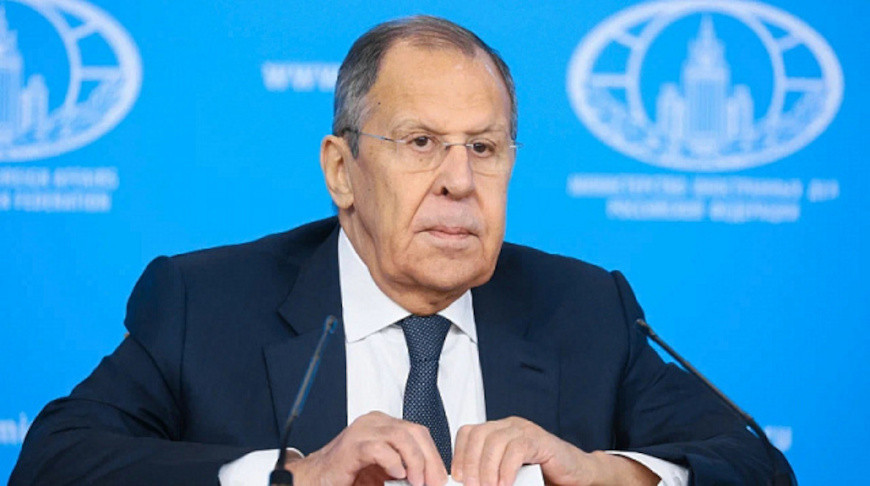
MOSCOW, 17 January (BelTA - TV BRICS) - Russia's plans on the international track in the new year, strengthening
partnership with BRICS and SCO, and prospects for developing
cooperation with Latin America. Russian Foreign Minister Sergey Lavrov
spoke about this and much more at the annual press conference. The
moderator was Maria Zakharova, the official representative of the
Russian Foreign Ministry.
The Russian Foreign Minister was asked questions by journalists from a number of TV BRICS partner media outlets from China, Iran, Vietnam, and Venezuela.
During the press conference Lavrov noted the important role of cooperation between Russia and China in international relations. Responding to a question from a representative of Xinhua News Agency, he said that the Russia-China partnership represents one of the main stabilising factors of modern international life.
He said the structures established on the basis of the Russia-China partnership, including the Shanghai Cooperation Organisation (SCO), the Eurasian Economic Union (EAEU), and BRICS, belong to new-type associations.
The IRNA journalist, for his part, asked the Foreign Minister about the details of the Comprehensive Strategic Partnership Agreement between Russia and Iran, which is scheduled to be signed on 17 January during Iranian President Masoud Pezeshkian's visit to Moscow. Lavrov stressed that the agreement is constructive in nature and aims to strengthen the capabilities of Russia, Iran, and their partners to better develop the economy and address social issues.
A question posed by a representative of Vietnam News Agency (VNA) concerned the possible construction of Vietnam's first nuclear power plant Ninh Thuan-1 with Russia's participation. Lavrov noted that thanks to this, the list of joint initiatives between Moscow and Hanoi could be enriched with another important project.
"We are not just building a plant and subsequently operating it, we are creating an industry for the respective country, including the training of scientific personnel to work at these plants," the Russian foreign minister said.
In turn, a journalist of the Venezuelan TV channel teleSUR asked the Russian minister about the prospects for cooperation between Russia and Latin America. The diplomat called this region one of the powerful poles of the emerging multipolar world order, adding that Russia has extensive relations with almost all countries, including Argentina, Brazil, Venezuela, Cuba, and Nicaragua.
Besides, Lavrov said during the press conference that the UN Security Council needs to be reformed. According to him, India and Brazil by all parameters have earned the right to be permanent members of the Security Council.
Earlier, on 26 December, the Russian Foreign Minister also stressed the consolidating role of Russia and China for the countries of the Global South. He called the interaction between the two states through BRICS an example of the positive impact of Beijing and Moscow on international relations.
The Russian Foreign Minister was asked questions by journalists from a number of TV BRICS partner media outlets from China, Iran, Vietnam, and Venezuela.
During the press conference Lavrov noted the important role of cooperation between Russia and China in international relations. Responding to a question from a representative of Xinhua News Agency, he said that the Russia-China partnership represents one of the main stabilising factors of modern international life.
He said the structures established on the basis of the Russia-China partnership, including the Shanghai Cooperation Organisation (SCO), the Eurasian Economic Union (EAEU), and BRICS, belong to new-type associations.
The IRNA journalist, for his part, asked the Foreign Minister about the details of the Comprehensive Strategic Partnership Agreement between Russia and Iran, which is scheduled to be signed on 17 January during Iranian President Masoud Pezeshkian's visit to Moscow. Lavrov stressed that the agreement is constructive in nature and aims to strengthen the capabilities of Russia, Iran, and their partners to better develop the economy and address social issues.
A question posed by a representative of Vietnam News Agency (VNA) concerned the possible construction of Vietnam's first nuclear power plant Ninh Thuan-1 with Russia's participation. Lavrov noted that thanks to this, the list of joint initiatives between Moscow and Hanoi could be enriched with another important project.
"We are not just building a plant and subsequently operating it, we are creating an industry for the respective country, including the training of scientific personnel to work at these plants," the Russian foreign minister said.
In turn, a journalist of the Venezuelan TV channel teleSUR asked the Russian minister about the prospects for cooperation between Russia and Latin America. The diplomat called this region one of the powerful poles of the emerging multipolar world order, adding that Russia has extensive relations with almost all countries, including Argentina, Brazil, Venezuela, Cuba, and Nicaragua.
Besides, Lavrov said during the press conference that the UN Security Council needs to be reformed. According to him, India and Brazil by all parameters have earned the right to be permanent members of the Security Council.
Earlier, on 26 December, the Russian Foreign Minister also stressed the consolidating role of Russia and China for the countries of the Global South. He called the interaction between the two states through BRICS an example of the positive impact of Beijing and Moscow on international relations.













